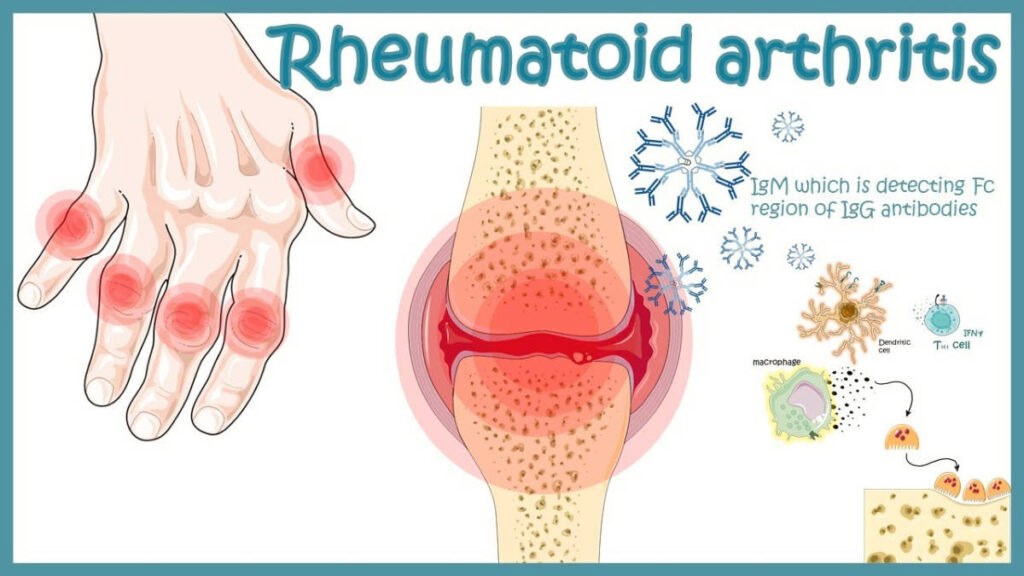Are you looking for natural ways to manage the symptoms of rheumatoid arthritis? If so, you’ve come to the right place! In this blog post, we’ll be exploring five natural ways to manage the symptoms of rheumatoid arthritis. We’ll discuss dietary modifications, lifestyle changes, supplements, and other remedies that may help alleviate the pain and other symptoms associated with rheumatoid arthritis.

We’ll also provide practical tips for incorporating these natural remedies into your daily routine. By the end of this post, you’ll have a better understanding of the natural steps you can take to manage your rheumatoid arthritis symptoms. So let’s get started!
Rheumatoid Arthritis
Rheumatoid arthritis is a chronic autoimmune disease that affects the joints. The disease is caused by the body’s immune system attacking its own tissues. The condition can be excruciating and debilitating. There is no cure for rheumatoid arthritis, but treatments available can help manage the symptoms. Treatment typically includes medications, physical therapy, and surgery.
Overview of Rheumatoid Arthritis
Rheumatoid arthritis is a chronic autoimmune disease that causes inflammation of the joints. The condition is caused by the body’s immune system attacking the cartilage and bone in the joints. The inflammation can lead to pain, stiffness, and limited movement. There is no cure for rheumatoid arthritis, but treatments can help manage the disease and improve the quality of life.
Natural Ways to Manage Symptoms
There are many natural ways to manage symptoms of rheumatoid arthritis, including using over-the-counter medications and supplements, avoiding triggers, and getting regular exercise. Some people find that using over-the-counter medications and supplements helps to reduce their symptoms, while others find that they don’t need them. Some people find that avoiding triggers helps to reduce their symptoms, while others find that they can’t avoid all of their triggers. Getting regular exercise can also help to reduce symptoms, as can using heat therapy.
Diet and Nutrition
There is no single answer to the question of how best to manage rheumatoid arthritis (RA), as the condition and its treatments vary from person to person. However, there are a few general principles that can help to improve your diet and nutrition.
- First, it is important to maintain a healthy weight. People with RA are more likely to have obesity and other chronic health conditions, so it is important to make sure that you are eating a balanced and nutritious diet.
- Second, it is important to limit your intake of processed foods and sugary drinks. These foods can aggravate RA symptoms, and can also increase your risk of other chronic health conditions.
- Finally, it is important to get regular exercise. Exercise can help to reduce inflammation and improve your overall health.
Foods to Include
There are many foods that can be helpful in managing rheumatoid arthritis, but it is important to consult with a doctor or nutritionist to determine what will work best for you. Some good foods to include in a rheumatoid arthritis diet are:
- Fish, especially fatty fish such as salmon, tuna, and mackerel. These fish are high in omega-3 fatty acids, which have been shown to be beneficial for the health of the joints.
- Vegetables, including leafy greens, cruciferous vegetables, and tomatoes. These vegetables are high in antioxidants, which can help to reduce the risk of inflammation.
- Whole grains, such as brown rice, quinoa, and oats. These grains are high in fiber and antioxidants, which can help to reduce the risk of inflammation.
- Low-fat dairy products, such as yogurt, cheese, and milk. These dairy products are high in calcium and other nutrients that can help to improve joint health.
- Sugars, such as honey, agave nectar, and maple syrup. These sugars are low in calories and can help to provide energy for people with rheumatoid arthritis.
Foods to Avoid
There are a few foods that people with rheumatoid arthritis should avoid to manage the condition. These include:
-Wheat
-Gluten
– Dairy products
– Fish
– Shellfish
– Eggs
– Sugar
– Artificial sweeteners
People with rheumatoid arthritis should also avoid physical activity that is too strenuous. This includes anything that causes pain, such as overexertion or weightlifting. Read this if you are suffering from arthritis.
Exercise for Relief
There are many different types of exercise that people with rheumatoid arthritis can do to help manage their condition. Some exercises are gentle and can be done at home, while others may require the use of a health club or other facility.
Some exercises that can be done at home include stretching, gentle aerobic activity, and weight-bearing exercises, such as walking or swimming. Gentle aerobic activity can be done by walking, biking, swimming, or using an elliptical trainer. Weight-bearing exercises can be done by doing squats, lunges, or stair climbing.
Some people with rheumatoid arthritis find that participating in a sport or exercise class is helpful in managing their condition. Sports and exercise classes can be gentle or more vigorous and can include activities such as swimming, biking, running, and weight-bearing exercises.
It is important to talk to a doctor or rheumatologist about the best exercise for you, as the type of exercise you choose may depend on your individual condition and needs.
Strength Training
There is no one-size-fits-all answer to this question, as the best way to manage Rheumatoid Arthritis (RA) will vary depending on the individual’s symptoms and level of activity. However, many people find that strength training can be helpful in managing RA symptoms, including improving range of motion, reducing inflammation, and improving overall strength and flexibility.
When starting a strength training program for RA, it is important to consult with a doctor or physical therapist to determine the proper exercises and modifications for the individual. Some exercises that may be beneficial for RA include:
Squats
Squats can help improve the range of motion and strength in the legs, which can be especially beneficial for people with RA. Regularly performing squats can help improve balance, flexibility, and stability, as well as reduce pain and stiffness in the joints.
Upright rows
Upright rows can help improve strength and flexibility in the upper back and neck, which can be beneficial for people with Rheumatoid Arthritis (RA). Strengthening the muscles in this area can help reduce pain, stiffness, and fatigue associated with RA. Additionally, improving flexibility in the upper back and neck can help improve posture and range of motion for those with RA.
Leg presses
Leg presses can help strengthen and improve the flexibility of the hips and thighs, providing a range of benefits for people with RA. Regular leg presses can help reduce pain, improve mobility, and increase stability in these areas, leading to an overall improvement in quality of life.
Curls
Curls can help improve strength and flexibility in the shoulders, which can be particularly beneficial for those with Rheumatoid Arthritis (RA). Strengthening the muscles in the shoulders can help reduce pain, improve the range of motion, and help reduce the risk of further joint damage. Additionally, improved flexibility can help make everyday activities easier and reduce fatigue.
Push-ups
Push-ups are an effective way to improve strength and endurance in the chest muscles, which can provide a range of benefits for people with Rheumatoid Arthritis (RA). Regularly performing push-ups can help strengthen the chest muscles, improve posture, and reduce joint pain and stiffness associated with RA.
Planks
Planks are an effective exercise to help strengthen and stabilize the core muscles, which can be beneficial for people with RA (Rheumatoid Arthritis). Regularly performing planks can help improve core strength, balance, and stability, aiding in pain management and improving overall health.
Stress Management
There are many ways to manage stress, but the most important thing is to find what works best for you. Some people find that yoga or meditation helps them relax and de-stress. Others find that reading or listening to calming music helps them to relax. Whatever works for you, make sure to stick with it and find ways to increase your stress relief throughout the day. Additionally, try to get enough sleep and eat a healthy diet to help manage your arthritis.
Mindfulness
Mindfulness is a form of meditation that has been shown to be effective in managing conditions such as anxiety, depression, and chronic pain. It is thought that mindfulness can help to improve the flow of oxygen and blood to the affected area, which can help to reduce inflammation. mindfulness can also help to improve sleep and mood.
There is evidence that mindfulness can be helpful in managing Rheumatoid Arthritis. One study found that mindfulness training was effective in reducing pain and improving sleep quality in people with RA. Another study found that mindfulness training was effective in reducing stress and improving mood in people with RA.
Mindfulness may be particularly beneficial for people with RA because it can help to reduce stress and improve mood. Stress is known to play a role in the development of RA. Mindfulness can help to reduce stress and improve mood, which may help to reduce the development of RA.
Physical Activity
Physical activity is a key component of managing rheumatoid arthritis (RA). Physical activity can help improve joint function, reduce inflammation, and improve the overall quality of life. There are many types of physical activity that can be enjoyable and beneficial for people with RA. Some examples of physical activity that can be helpful for people with RA include:
• Walking
• Cycling
• Swimming
• Gardening
• Aerobics
• Strength training
• Yoga
It is important to find an activity that is enjoyable and can be completed regularly. Some people may find it helpful to join a physical activity group or participate in a physical activity program at the gym. It is also important to be aware of the limitations that people with RA may have when participating in physical activity. For example, people with RA may experience pain or swelling in their joints, so it is important to be cautious when participating in physical activity.
Supplements
There are many supplements that are recommended to manage rheumatoid arthritis. Some of the most common supplements include fish oil supplements, vitamin D supplements, glucosamine supplements, and chondroitin supplements. Many people find that taking these supplements helps to manage their arthritis symptoms.
Omega-3 Fatty Acids
There is evidence that omega-3 fatty acids may be beneficial in the management of rheumatoid arthritis (RA). A meta-analysis of randomized controlled trials (RCTs) found that omega-3 fatty acids were associated with a reduction in joint pain, stiffness, and morning stiffness. In addition, omega-3 fatty acids have been shown to improve the function of the immune system. While more research is needed to confirm these findings, omega-3 fatty acids may be an effective treatment for RA.
Vitamin D
There is a growing body of evidence that supports the use of vitamin D to manage RA. A study published in the journal Rheumatology in 2010 found that people with RA who took vitamin D supplements had a significant reduction in their disease activity score compared to those who did not take supplements. Another study published in the journal Annals of the Rheumatic Diseases in 2009 found that people with RA who took 400 IU of vitamin D per day had a significantly lower rate of joint damage and a shorter time to achieve a response to treatment than those who did not take vitamin D.
There are a few potential drawbacks to using vitamin D to manage RA. First, it is important to note that not all people with RA will respond to vitamin D supplementation. Second, vitamin D can be toxic in high doses, so it is important to monitor patients closely if they are taking it for RA. Finally, it is important to note that vitamin D supplements can be expensive, so it may be difficult for some people to afford them.
Conclusion
In conclusion, Rheumatoid Arthritis is a painful and difficult condition to manage. While there is no cure, there are several natural ways to manage the symptoms and help reduce discomfort. Incorporating healthy lifestyle choices, such as diet and exercise, as well as implementing stress management techniques, can help improve overall health and reduce the severity of RA symptoms.
Additionally, natural supplements, such as turmeric, omega-3 fatty acids, and ginger can help reduce inflammation, while gentle yoga and stretching can help increase mobility and reduce pain. With a comprehensive approach, it is possible to alleviate symptoms and lead a healthy, comfortable life. If you find these blogs helpful, please share this with your loved ones and friends. You are also welcome to visit our other related blog for more tips and recommendations.


